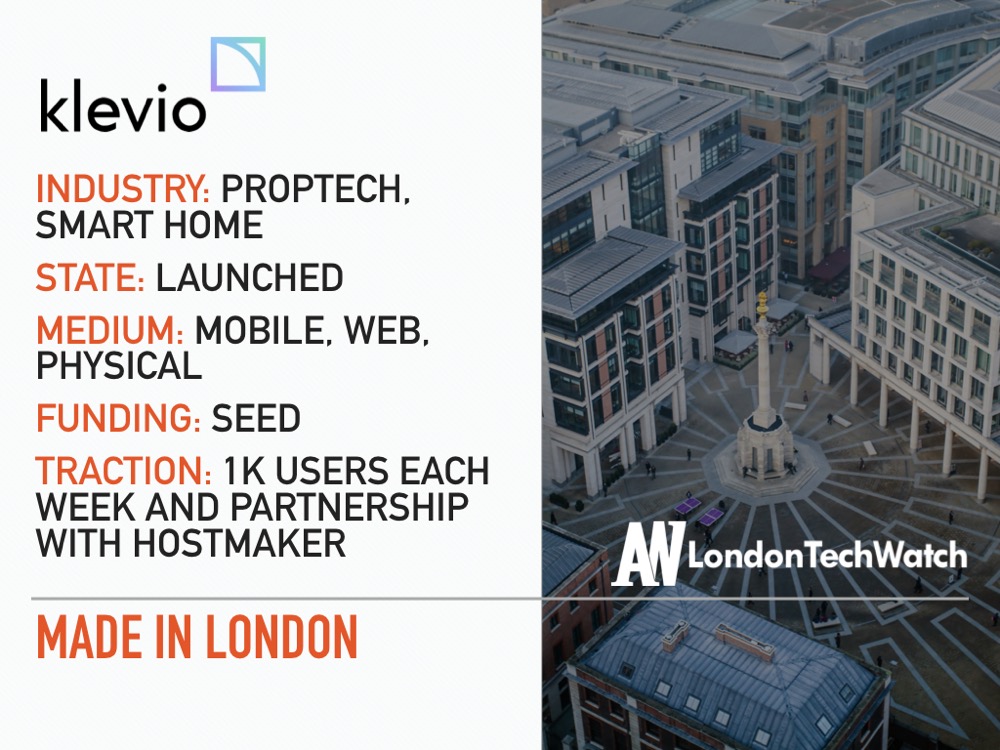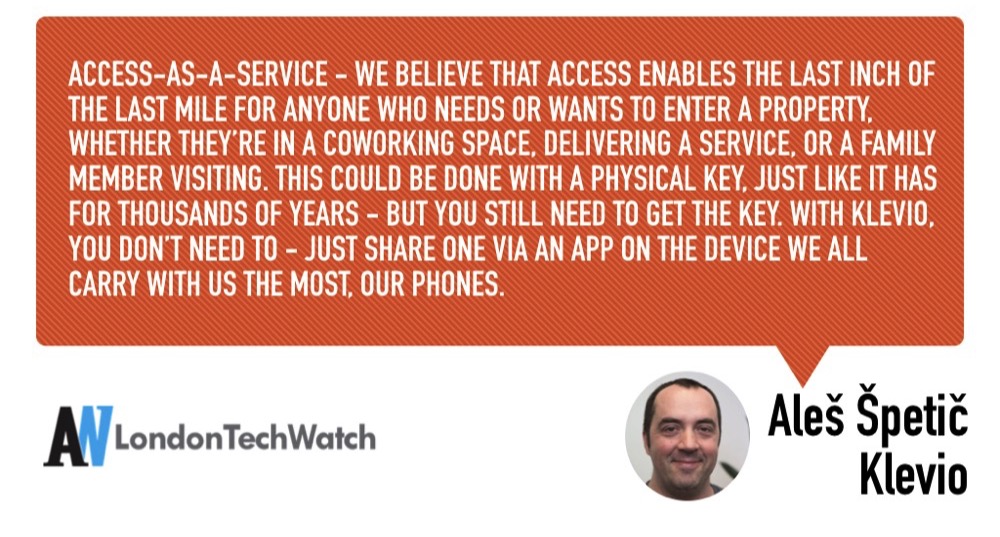The intercom has been a staple feature in homes and offices since the 1950s, but today, consumers expect a lot more. Klevio created the smart intercom and digital access platform suitable for modern buildings. Klevio allows digital keys to be created and shared, with custom parameters, while enabling entry to be granted remotely at any time. People can even use Klevio’s system to manage access to the communal area of buildings. In addition, it easily integrates with a building’s current intercom system.
London TechWatch sat down with CEO and Cofounder Aleš Špetič to learn more about creating a patented, smart-lock company, the future of keyless entry and smart homes, and the company’s future plans.
Tell us about the product or service Klevio offers.
Klevio One is a smart intercom for digital access to your home or office. It allows digital keys to be created and shared, enabling entry to be granted remotely at any time – via an app or (desktop-based) dashboard. Unlike other smart locks on the market, Klevio can also manage access to the communal area of apartment buildings and is hidden from view within your home. There’s no need to change your existing lock!
How is Klevio different?
Much like Apple Pay and bank cards, Klevio does not replace the main key because it installs a digital strike on the inside of the door frame, giving you the peace of mind that a traditional key is still available when needed.
Klevio is not visible from the outside, and integrates with the intercom of an apartment building, allowing for digital access to the communal doors of a building as well as the apartment’s private door. Klevio holds the patent for this in multiple countries, making it the most complete, simplest smart intercom on the market.
Recipients of a digital key can access the building dependent on the parameters set by the owner or manager, such as time, or can be given access remotely.
What market is Klevio attacking and how big is it?
Although Klevio is suitable and available to all homeowners, short term lets are a key market for us right now.
By far the largest platform for short term stays in the UK, Airbnb, recently shared that the platform enabled 8.4M guests to stay at UK properties between July 2017 and July 2018. Of the properties available on Airbnb, London is the home of 64K active listings on the site.
With Klevio, private owners can provide guests or family a temporary key when running late. For property managers in both long- and short-term letting setups, Klevio provides the freedom to grant access to contractors or guests. Klevio removes one of the biggest costs of property management, the time and money involved in key handovers.
Klevio is perfectly placed to work alongside landlords and managers to streamline operations across the board, removing travel with keys to properties for guests, cleaners, plumbers and any other contractor or service provider, especially for emergencies.
Who do you consider to be your primary competitors?
Any smart lock, lock or other access providers. We’re just simplifying that final inch to get someone through the door to their final destination, without a lockbox, pin code, or need to physically be there to let someone in.
What is the business model?
Access-as-a-Service – we believe that access enables the last inch of the last mile for anyone who needs or wants to enter a property, whether they’re in a coworking space, delivering a service, or a family member visiting. This could be done with a physical key, just like it has for thousands of years – but you still need to get the key. With Klevio, you don’t need to – just share one via an app on the device we all carry with us the most, our phones.
Tell us a little about your background and what inspired the business?
I’m a trained engineer with an MBA from California State University and a published author with a book on database programming. Before launching Klevio, I ran four tech startups – including Zemanta and CubeSensors.
In 2016, I cofounded Klevio alongside Demetrios Zoppos (cofounder of onefinestay), Marko Mrdjenovič (former CTO at CubeSensors), and Mark Curling.
The keyless entry concept was initially prototyped at onefinestay, which was responsible for managing access to thousands of homes. When onefinestay became a large operation, looking after so many keys became a big problem; it was this original pain point that led to the idea of remotely managed, keyless entry.
In fact, onefinestay cofounder Greg Marsh was an early backer of Klevio, alongside many other investors like Robin Klein (LocalGlobe Partner & angel investor).
Tell us what building your company in London has been like?
London is a city of opportunity. It was the perfect place to test and roll out Klevio because it gave us access to a large market and customer base: consumers, offices, agents, short-let providers, property management firms, and more. While you do pay a premium to be in London, you’re also in the right place to connect with investors and attract key talent that can help scale the company. You’re in one of the best ecosystems outside of Silicon Valley and certainly in Europe to grow a business. For a company that is working alongside the growing short term let market, being in one of the world’s most popular tourist destinations is truly a great place to be.
London is a city of opportunity. It was the perfect place to test and roll out Klevio because it gave us access to a large market and customer base: consumers, offices, agents, short-let providers, property management firms, and more. While you do pay a premium to be in London, you’re also in the right place to connect with investors and attract key talent that can help scale the company.
What are the milestones that you plan to achieve within six months?
Our main focus is growth across the UK and look at new features and ways to improve our product. We’ve already established a great partnership with short term rental management company Hostmaker, and we are looking to make more strategic partnerships in the coming year.
If you could be put in touch with one person in the London Tech community who would it be and why?
Boris Johnson – just for 15 minutes. I need to explain a few things to him about his Brexit position and the impact it will have on London’s startup community…
What does being “Made in London” mean to you and your company?
London gives us access to one of the largest markets in Europe, and one of the most mature when it comes to the infrastructure needed to help support and grow a scaling business like ours. Access to finance, talent, and industry is all available here on a larger scale, which is why we have a split team. We’re divided between London, where a lot of our sales and delivery is based, with a technical team in Slovenia to support us. Our customers and the bigger opportunity for growth is in the UK.
What else can be done to promote early-stage entrepreneurship in London?
Remove the uncertainty of Brexit. It has already made an impact on countless businesses, and three years on, we need to know what’s going to happen. Once that can be addressed, we can look at the next steps to promote the early-stage tech scene in London again.
What is your favorite restaurant in London?
Gunpowder – the original in Spitalfields.





